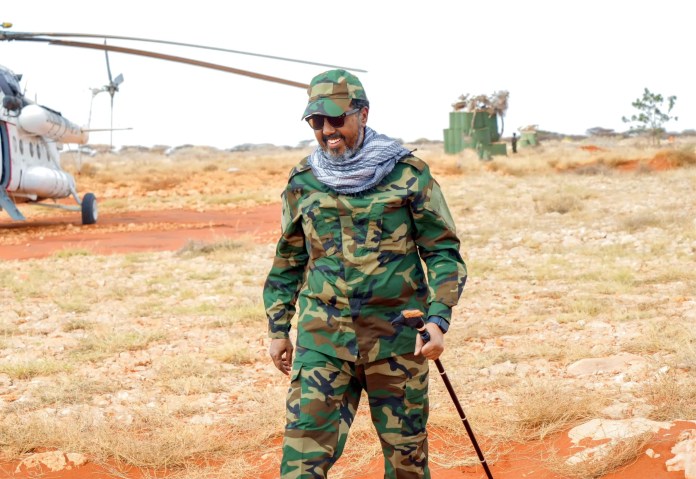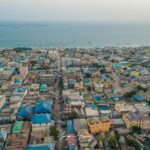The article titled “The utilization of the War on Terror as a Façade for Establishing a Dictatorial Regime” by Sheiknor Abukar Qasim is an unfounded criticism that tries to cover up what President Dr Hassan Sh. Mahamud is trying achieve for Somalia. Failure to land a job or a position in the current administration have made some intellectuals who happen to have been supporting the previous regime to resort to writing criticism articles. It is important to note that the critics in the above reviewed article appears to be heavily biased and lacks a balanced perspective. Here are some points of critique:
Lack of Evidence: The article makes several strong claims about the president’s behavior, such as turning the country into a “family affair” and a “one man show.” However, it lacks concrete evidence or examples to support these allegations. Including specific instances or actions that would strengthen the credibility of the criticism.
Generalization of Challenges: The author ignores the fact that Somalia is a war-torn country emerging from decades of lawlessness and fighting with a ruthless international terrorist organization. Given the above challenges in Somalia and the fact that the current administration passed over 10 essential bills while liberating a vast territory from the terrorist it deserves credit and not condemnation. Therefore, it is baseless to describe the cabinet as dysfunctional and the parliament as ineffective, it simply tends to oversimplify complex issues. Offering a more nuanced analysis of the specific problems and their origins would provide a clearer understanding of the situation.
Assumption of Motives: The article makes assumptions about the president’s motives, such as using the “war on terror” as a façade for establishing a dictatorial regime. While questioning motives is a valid form of criticism, it is essential to base such claims on concrete evidence or statements from the president himself.
Lack of Alternative Solutions: While the article criticizes the president’s approach, it falls short of proposing alternative solutions or strategies to address the challenges facing Somalia. Constructive criticism should not only highlight problems but also offer viable alternatives for improvement.
Overemphasis on Negativity: The overall tone of the article is overwhelmingly negative, creating a one-sided narrative. Including any positive aspects, achievements, or efforts made by the president or the government, even if limited, would provide a more balanced perspective.
Assessment of Counterterrorism Efforts: The article criticizes the president for a lack of progress in combating Al-Shabab but does not provide a thorough analysis of the counterterrorism strategies in place or suggest alternative approaches to effectively address the menace.
Contrary to the arguments in the said article, since his election on May 2022 (the) President Dr Hassan Sh. Mahamud has done the following:
Promoted Inclusive Governance
Since his election in May 2022, President Dr Hassan Sh. Mahamud has been promoting inclusive governance and working towards political stability and reconciliation in Somalia. He has aimed to build a more inclusive political environment that brought together various political factions, clans, and regions within the country. Somalia has faced complex challenges, including political instability, security issues, and humanitarian crises, and promoting inclusivity in governance was seen as a crucial step toward addressing these challenges. Inclusive governance involves the participation of diverse groups and communities in decision-making processes, ensuring that various voices are heard and represented. In a country like Somalia, which has experienced decades of conflict, inclusive governance is often considered a key factor in fostering stability and rebuilding a functional state. The cabinet and parliament have been effective as President Dr Hassan Sh. Mahamud has made efforts to promote the efficiency of parliament through inclusive governance. Therefore, it is safe to say that Somalia is on the right path towards political stability. For Instance, we have the two houses of Parliament working together and working with the executive. The president, the prime minister and the cabinet working with the Federal Member States in harmony except Puntland that decided not to join the rest.
Augmented Counterterrorism Efforts
The Somali government under the leadership of President Dr Hassan Sh. Mahamud has recognized the importance of involving local authorities and communities in the fight against Al-Shabaab. Decentralization efforts have been implemented to empower local governments, enabling them to take a more active role in maintaining security within their regions. This approach has not only improved intelligence gathering but also fostered stronger relationships between the government and local communities. In addition, the Somali National Army (SNA), alongside the African Union Transition Mission in Somalia (ATMIS), has undergone significant reforms, including improved training, better equipment, and an enhanced command structure. These improvements have resulted in more effective military operations against Al-Shabaab. Furthermore, the Somali government under the leadership of President Dr Hassan Sh. Mahamud has also made substantial progress in improving its intelligence capabilities. Effective intelligence is vital in identifying and neutralizing Al-Shabaab’s leadership and disrupting their operations. Collaborative efforts with international partners, including the United States and regional intelligence agencies, have enhanced intelligence sharing and the capacity to target Al-Shabaab’s leadership. Besides, the Somali government has also launched a media war on Al-Shabaab, blocking no less than 10 news websites affiliated to the terror group and which were used as a media tool to spread extremism and violence. Telecommunications companies have also been mandated to play a role in eliminating the movement, in addition to pulling down approximately 600 social media accounts propagating violence.
In addition, the struggle against the militant extremist group Al-Shabaab has been a long and arduous battle for the government of Somalia. For years, this Islamist militant group has terrorized the nation, causing instability and hindering progress. However, recent developments and concerted efforts by the Somali government, alongside regional and international partners, have shown signs of progress in the fight against Al-Shabaab. Under the leadership of President Dr Hassan Sh. Mohamud, the government has done the following:
Community Engagement and Rehabilitation: Beyond the military approach, the Somali government has also recognized the importance of winning hearts and minds. Efforts have been made to engage with local communities to address the root causes of radicalization and extremism. Additionally, programs have been introduced to rehabilitate former Al-Shabaab fighters and reintegrate them into society. These initiatives are critical for long-term stability and peace.
International Support: The government’s efforts have been bolstered by the continued support of the international community. Countries such as the United States and the United Kingdom have provided military assistance, training, and funding to enhance the capacity of the Somali security forces. International partners have also played a key role in facilitating diplomatic efforts aimed at bringing stability to the region.
Improved government’s military objectives and capabilities: The government of Somalia has devoted adequate resources to achieve military objectives. Government has continued to develop clear and realistic military objectives that align with national security goals. These objectives are adaptable to changing threats and geopolitical conditions. The government of Somalia has also continued to invest in modernizing the armed forces by updating equipment, weaponry, and infrastructure. This includes the development and procurement of advanced military technology, such as drones, cyber warfare capabilities, and next-generation weaponry. There has also been provision of comprehensive training to military personnel, including not just tactical training but also leadership, strategy, and international law. A well-trained and educated military is more effective and less likely to commit war crimes.
Improved efficiency in Logistics and Supply Chains for Military Operations: The government of Somalia has continued to develop a comprehensive logistics and supply chain strategy that aligns with the military’s operational objectives. This should involve forecasting requirements, setting clear goals, and creating a roadmap for implementation. Government has also invested in improving transportation infrastructure, including roads, ports, and airports, to facilitate the movement of personnel, equipment, and supplies. This will help in expediting the delivery of resources to military units. There has also been use of technology and modern systems for tracking and managing logistics and supply chains. Implementing an integrated logistics management system helps in streamlining processes and enhance visibility.
Pushed for Electoral Reforms
Despite the claims that President Dr Hassan Sh. Mahamud is planning to postpone elections, there is no evidence that the president is making any unilateral decisions and pushing for a transition from a parliamentary system to a presidential system. In fact, the president has been pushing for electoral reforms through implementation of one person, one vote system within two years. The president is pushing for a more representative democracy where the government is starting to implement elections based on people’s votes, enabling Somali citizens to choose their leaders from the district level up to the presidency. There has been consultations and public participation as the reforms are being steered by National Consultative Council organized by the president, prime minister and heads of regional governments.
Conclusion
Based on the trajectory of the achievement of the current president of Somalia, it’s safe to say that political stability and sustainable development is achievable in the next few years under the leadership of President Dr Hassan Sh. Mahamud. In a short period of time, President Dr Hassan Sh. Mahamud has made efforts towards ensuring inclusive governance that entails the participation of diverse groups and communities in decision-making processes, ensuring that various voices are heard and represented. President Dr Hassan Sh. Mahamud has also been at the forefront in pushing for electoral reforms that aim at implementing one person, one vote system within two years. This would be a more representative democracy where elections will be based on people’s votes, enabling Somali citizens to choose their leaders from the district level up to the presidency. The president’s three pronged strategy, which in addition to military means, seeks to counter terrorism from the financial and ideological fronts has augmented the counter terrorism efforts. I believe this is key towards a more politically stable and developed Somalia. Furthermore, current administration passed over 10 essential bills while liberating a vast territory from the terrorist it deserves credit and not condemnation. Therefore, it is baseless to describe the cabinet as dysfunctional and the parliament as ineffective.
By LLM. Abdullahi Mohodin Hassan (Abdullahi Yabarow)





